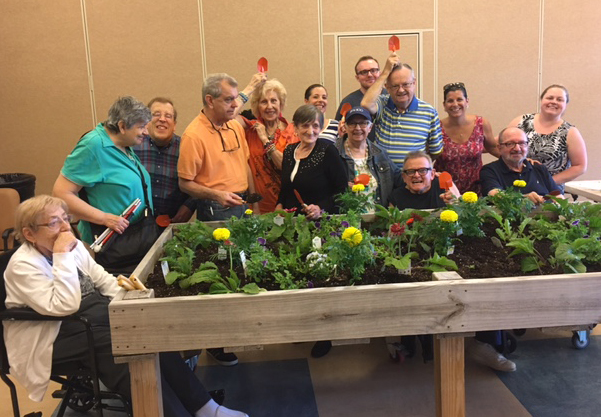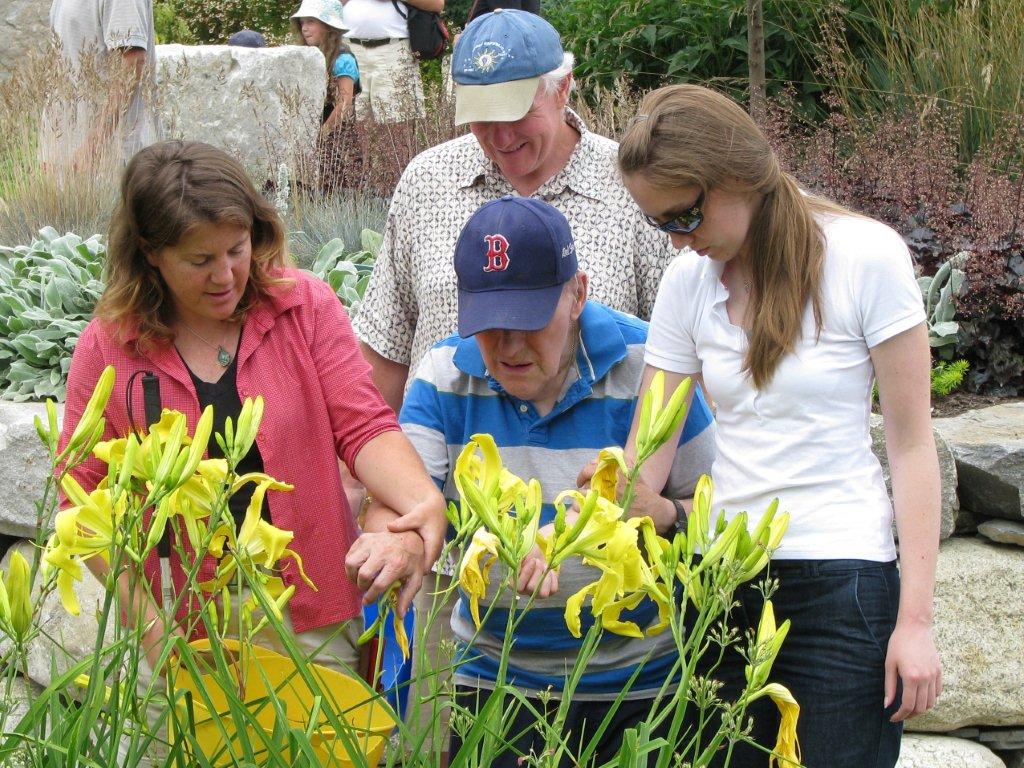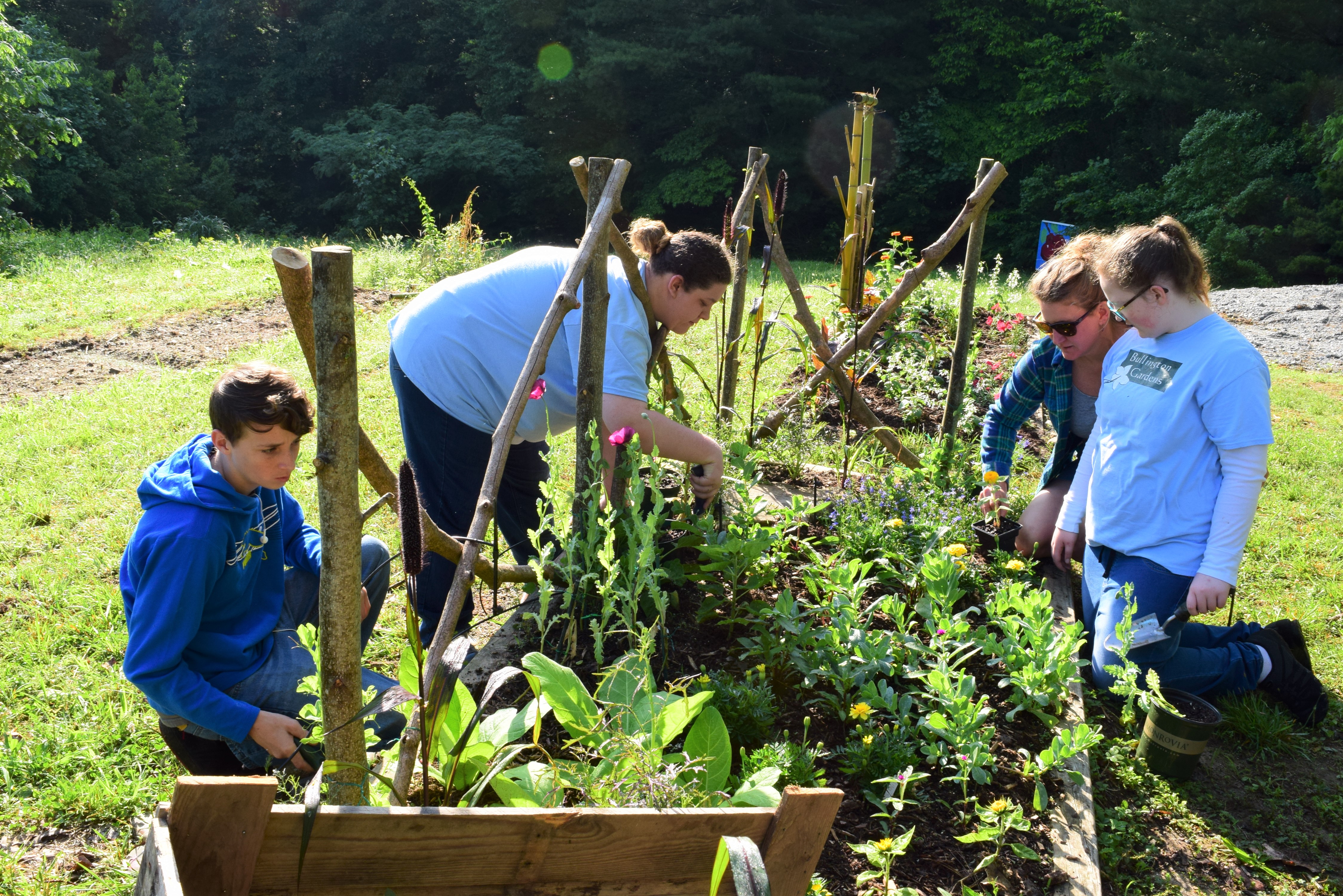Buehler Family Foundation Enabling Garden at Naples Botanical Garden, Fl.
 Horticultural therapy is a time-proven practice. The therapeutic benefits of garden environments have been documented since ancient times. In the 19th century, Dr. Benjamin Rush, a signer of the Declaration of Independence and recognized as the "Father of American Psychiatry," was first to certificate the positive effect working in the garden had on individuals with mental illness.
Horticultural therapy is a time-proven practice. The therapeutic benefits of garden environments have been documented since ancient times. In the 19th century, Dr. Benjamin Rush, a signer of the Declaration of Independence and recognized as the "Father of American Psychiatry," was first to certificate the positive effect working in the garden had on individuals with mental illness.
In the 1940s and 1950s, rehabilitative intendance of hospitalized war veterans significantly expanded acceptance of the do. No longer limited to treating mental disease, horticultural therapy practise gained in credibility and was embraced for a much wider range of diagnoses and therapeutic options. Today, horticultural therapy is accepted as a beneficial and effective therapeutic modality. Information technology is widely used within a broad range of rehabilitative, vocational, and customs settings.
Horticultural therapy techniques are employed to assist participants to learn new skills or regain those that are lost. Horticultural therapy helps improve memory, cognitive abilities, job initiation, language skills, and socialization. In physical rehabilitation, horticultural therapy can help strengthen muscles and improve coordination, rest, and endurance. In vocational horticultural therapy settings, people acquire to work independently, trouble solve, and follow directions. Horticultural therapists are professionals with specific education, training, and credentials in the use of horticultural for therapy and rehabilitation. Read the formal definition of the part of horticultural therapists.
For a comprehensive overview of the practice of horticultural therapy, delight read the AHTA Position Newspaper. To follow the latest media buzz on horticultural therapy, visit our blog.
Definition of a Horticultural Therapist
Horticultural therapists have a foundation of knowledge in found science, human being scientific discipline, and horticultural therapy principles and experience in the application of horticultural therapy practices.
As the American Horticultural Therapy Clan strives towards certification for horticultural therapists, public awareness of what is, and what is non, a horticultural therapist is essential for professional recognition.
The American Horticultural Therapy Association supports the definition that a horticultural therapist is someone who:
- Has a minimum of a bachelor'south degree in horticultural therapy, or the minimum of a bachelor's degree with additional coursework in plant science, human science, and horticultural therapy.
- Has completed a 480-hour internship in horticultural therapy.
- Is professionally registered as a horticultural therapist with the American Horticultural Therapy Clan equally an HTR, Horticultural Therapist-Registered.
 To accelerate the profession, it is important that the public recognize horticultural therapists every bit professionals with specific didactics, training, and credentials in the use of horticulture for therapy and rehabilitation. Professional registration informs the public that the horticultural therapist has met the required education and experience to practice horticultural therapy.
To accelerate the profession, it is important that the public recognize horticultural therapists every bit professionals with specific didactics, training, and credentials in the use of horticulture for therapy and rehabilitation. Professional registration informs the public that the horticultural therapist has met the required education and experience to practice horticultural therapy.
The American Horticultural Therapy Association recognizes that in that location are individuals without professional credentials who represent themselves as practicing horticultural therapists having completed a certificate in horticultural therapy. While a certificate is of value in providing the horticultural therapy education, a certificate does not provide education in horticulture, human scientific discipline, nor provide practical experience. The Association does not support the use of horticulture equally therapy by individuals who do not have the required educational background nor possess professional credentials.
The Association recognizes that there are professionally credentialed practitioners who utilize horticulture every bit a therapeutic tool in their practice. Many credentialed professionals have completed a horticultural therapy certificate programme. While the AHTA accredited document coursework provides valuable education, to develop a thorough understanding of the discipline, coursework in horticulture and homo science is necessary. The Association welcomes and encourages, credentialed professionals to pursue professional registration with the American Horticultural Therapy Clan.
Pedagogy for Horticultural Therapists

For those interested in pursuing a career in horticultural therapy, the American Horticultural Therapy Clan (AHTA) offers the merely recognized credential for horticultural therapists: HTR, Horticultural Therapist – Registered. The HTR credential may exist granted after completing a standardized educational curriculum and an internship supervised by an AHTA Registered Horticultural Therapist. This curriculum is built on the foundation of a bachelor's degree in horticultural therapy, or the minimum of a bachelor's degree with additional coursework in plant science, human science, and horticultural therapy.
The American Horticultural Therapy Clan likewise accredits select certificate programs. Horticultural therapy document programs are instructional programs for college credit that are designed to provide a foundation in the theory and awarding of horticultural therapy for diverse populations. In accrediting these programs, AHTA assures that each program meets nationally-endorsed standards in the profession, and meets the horticultural therapy requirements for AHTA's voluntary professional registration programme. Information technology is important to know that upon completion of a certificate program ane is non certified as a horticultural therapist. Currently, certification is not an option for horticultural therapists; still, work is beingness done to achieve this for all HTRs.
A Give-and-take Almost Therapeutic Gardens

A therapeutic garden is a plant-dominated surroundings purposefully designed to facilitate interaction with the healing elements of nature. Interactions can exist passive or agile depending on the garden pattern and users' needs. There are many sub-types of therapeutic gardens including healing gardens, enabling gardens, rehabilitation gardens, and restorative gardens.
What makes a garden therapeutic? The basic features of a therapeutic garden tin can include broad and gently graded accessible entrances and paths, raised planting beds and containers, and a sensory-oriented institute selection focused on colour, texture, and fragrance. Larn more than by reading AHTA's characteristics of therapeutic gardens.
Frequently, landscape designers collaborate with horticultural therapists to create beautiful spaces that accommodate people with a broad range of abilities. While these gardens may represent the ideal, successful horticultural therapy programs practice non depend upon an elaborate garden design. Likewise, a professionally-designed therapeutic garden without a horticultural therapy programme is unlikely to deliver to its full potential.
To learn more than about therapeutic gardens, please explore:
American Society of Landscape Architects; Healthcare and Therapeutic Design Professional person Practice Network.
Therapeutic Landscapes Network, A resource for gardens and landscapes that promote health and well-being.
Source: https://www.ahta.org/about-horticultural-therapy
0 Response to "Buehler Family Foundation Enabling Garden at Naples Botanical Garden, Fl."
Postar um comentário